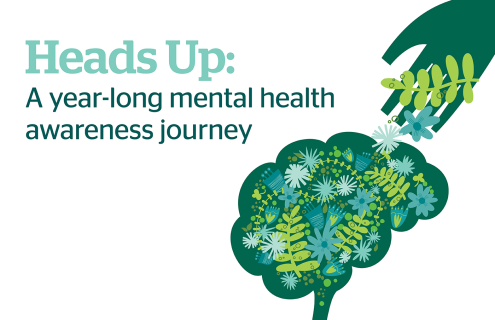
Every month, as part of a year-long effort to raise awareness of the issues and dispel the myths that lead to stigma, Dartmouth Health expert panelists and partners at the New Hampshire Union Leader and Seacoast Media Group have been focusing on different topics around mental health. This month, we explore some of the foundational public health programs designed to help identify mental illness in our friends, our family and ourselves, combat cultural stigma around mental health and instruct us on how to address emotional pain. These programs, known as the Five Signs and REACT, evolved over time and made immeasurable progress on how openly these issues are now discussed.
One of the first people to be affected by the Five Signs program, during the time of its initial global launch in 2015 through the following year, was its creator, Barbara Van Dahlen, PhD.
At the time, Van Dahlen, a child psychologist, was the founder and CEO of a national nonprofit called Give an Hour, and she was spending her time developing a mental health initiative that would have the backing of then-First Lady Michelle Obama. What she came up with was a simple idea: teach people how to spot the "Five Signs" of emotional suffering. People knew the signs of a stroke or heart attack, but couldn't reliably identify depression or anxiety.
"People don't know what they don't know. They don't know what they're looking at. So, we figured, start with the basics," Van Dahlen said.
The program spread across the country and the world. Former New Hampshire Supreme Court Chief Justice John Broderick introduced it to the Granite State, and later helped create the REACT program to guide people on how to address emotional suffering. Little did Van Dahlen know at the time she would be embarking on a journey of her own, inspired by this work. She would begin the search for her mother.
Van Dahlen had gotten into this work, because of an early exposure to mental illness within her family. She said her father, who raised her, suffered from post-traumatic stress, and her mother was diagnosed with late onset schizophrenia shortly after giving birth to her.
Her mother struggled with the illness for the rest of her life, according to Van Dahlen. Her parents separated when she was 8 years old, and by the time Van Dahlen was 13, she no longer knew where her mother was. It took her 40 years to find her.
It was not a Hollywood reunion.
After tracking her to a Los Angeles nursing home, and a painful first meeting, Van Dahlen tried again and had a better conversation.
"Once she felt safe, we talked. She was funny and thoughtful," Van Dahlen said. "I always thought I got my intelligence from my dad, but I could see how smart she was. I saw what I got from her."
They stayed in touch. But in 2017, her mother passed away.
"I'm grateful for the couple of years that we had, and that we were able to help her," Van Dahlen said.
Van Dahlen and Broderick discuss the origins and evolution of the Five Signs and REACT programs as panelists in a Heads Up webinar hosted by Dartmouth Health. It can be viewed on the Heads Up: A Year-long Mental Health Awareness Journey web page.